|
|
|
Sort Order |
|
|
|
Items / Page
|
|
|
|
|
|
|
| Srl | Item |
| 1 |
ID:
100069
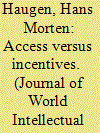

|
|
|
|
|
| Publication |
2010.
|
| Summary/Abstract |
Concerns have been expressed over the role of the World Intellectual Property Organization (WIPO) in influencing the intellectual property policies of other specialized agencies of the United Nations. This article reviews the policies of the Food and Agricultural Organization (FAO), World Health Organization (WHO) and United Nations Educational, Scientific and Cultural Organization (UNESCO), in addition to WIPO itself, and finds very interesting patterns of cooperation. While intellectual property law is primarily concerned with providing incentives for the production of new, creative and applicable arts and knowledge, human rights law is primarily concerned with providing improved access to goods crucial for human well-being and survival. While UNESCO has paid less attention to intellectual property rights over the last decades, rather emphasizing cultural preservation, both FAO and WHO have increased their focus on intellectual property rights. The latter two have increased their cooperation with WIPO, but without a formal agreement with WIPO. The article finds that WIPO, as a specialized agency, has to cooperate with specialized agencies, and there is no reason to believe that the cooperation will be in the form of a "one-way" process in which WIPO instructs the other agencies. At the same time, it must be acknowledged that intellectual property rights can also hamper research, in addition to impacting on the access to the crucial goods.
|
|
|
|
|
|
|
|
|
|
|
|
|
|
|
|
| 2 |
ID:
121987
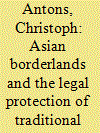

|
|
|
|
|
| Publication |
2013.
|
| Summary/Abstract |
Traditional knowledge related to biodiversity, agriculture, medicine and artistic expressions has recently attracted much interest amongst policy makers, legal academics and social scientists. Several United Nations organizations, such as the World Intellectual Property Organization (WIPO) and the Convention on Biological Diversity under the United Nations Environmental Programme (UNEP), have been working on international models for the protection of such knowledge held by local and indigenous communities. Relevant national, regional or provincial level legislation comes in the form of intellectual property laws and laws related to health, heritage or environmental protection. In practice, however, it has proven difficult to agree on definitions of the subject matter, to delineate local communities and territories holding the knowledge, and to clearly identify the subjects and beneficiaries of the protection. In fact, claims to 'cultural property' and heritage have led to conflicts and tensions between communities, regions and nations. This paper will use Southeast Asian examples and case studies to show the importance of concepts such as Zomia, 'regions of refuge' and mandala as well as 'borderlands' studies to avoid essentialized notions of communities and cultures in order to develop a nuanced understanding of the difficulties for national and international lawmaking in this field. It will also develop a few suggestions on how conflicts and tensions could be avoided or ameliorated.
|
|
|
|
|
|
|
|
|
|
|
|
|
|
|
|
| 3 |
ID:
103028
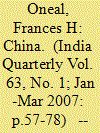

|
|
|
| 4 |
ID:
109202
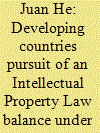

|
|
|
|
|
| Publication |
2011.
|
| Summary/Abstract |
Progressive and steady technological advancement in developing countries has generated serious debate whether government discretion to manoeuvre IP laws is unduly curbed by the ever-increasing and fragmented international regulatory regime. The global regime has expanded from WIPO conventions to TRIPS at the WTO, and to a myriad of regional and bilateral agreements stipulating TRIPS-plus standards. The way that a harmonized IP fashion operates affects internal decisions in striking a proper balance between incentives to create and those to promote dynamic competition. For developing countries, the ultimate goal is to transform to a knowledge-based and innovative economy. In this regard, the TRIPS "balance" objective is ambiguously formulated and hence cannot be actively considered by WTO panels. Secondly, conditions in the individual exceptions are so restrictively applied that governments are set back from devising innovative exceptions to balance their obligatory commitments. To maximize the use of TRIPS leeway for technological development schemes, both deficiencies need to be managed by a balance-oriented initiative taken by the WTO judicial and/or legislative bodies.
|
|
|
|
|
|
|
|
|
|
|
|
|
|
|
|
| 5 |
ID:
189797
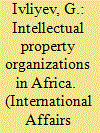

|
|
|
|
|
| Summary/Abstract |
THE 1970s saw the beginning of the large-scale process of various countries joining forces to protect intellectual property (IP) rights. The European Patent Convention, signed in 1973, is a set of general rules on patenting various kinds of inventions. African regional IP organizations play a special role in regional IP protection systems, and in this article, we examine their activities.
|
|
|
|
|
|
|
|
|
|
|
|
|
|
|
|
| 6 |
ID:
095059
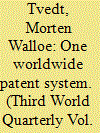

|
|
|
|
|
| Publication |
2010.
|
| Summary/Abstract |
This article offers a discussion of the probable effects of a Worldwide Patent System for developing countries. It draws upon insights from the ongoing processes in the World Intellectual Property Organization and elsewhere relevant for the global patent system and discusses these features from a developing country perspective. For scientifically advanced developing countries the effect in their most advanced and most global enterprises is potentially positive as they will benefit as much as other multinational companies. In areas of research and development where these most advanced developing countries do not possess a high level of technological capacity, a Worldwide Patent System is unlikely to create any benefits for them. For countries with the ability to copy and produce inventions made by others a Worldwide Patent System will have a negative effect as inventors will have little opportunity to utilise the system, whereas they will be bound by a larger number of exclusive rights narrowing down their space for innovation. For the least developed countries an additional problem arises: it might become even more difficult to import essential goods because patents will be in force in these countries even though there is no production of that product in the country.
|
|
|
|
|
|
|
|
|
|
|
|
|
|
|
|
| 7 |
ID:
110321
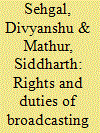

|
|
|
|
|
| Publication |
2011.
|
| Summary/Abstract |
Transmission of data through a signal based approach has been made possible by the broadcasting organizations, but it has come at certain costs. The problem posed by incidences of signal theft induced the member states of World Intellectual Property Organization to create a new international tool in the form of a treaty to tackle this problem. The paper seeks to analyse this in the light of present legal regime where protection is granted to the broadcasting organizations, and whether granting further protection in the form of exclusive rights will serve the interest of developing nations or not. The representatives of developing nations have made it clear that if the treaty is not based on elementary and absolutely necessary rights, it should be abandoned. A study of the treaty makes it clear that the primary purpose of treaty is not to tackle signal theft, which makes its primary agenda ancillary in nature.
|
|
|
|
|
|
|
|
|
|
|
|
|
|
|
|
| 8 |
ID:
085862
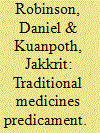

|
|
|
|
|
| Publication |
2008.
|
| Summary/Abstract |
The ongoing use and protection of traditional medicines presents unique challenges for authorities, practitioners and stakeholders. With changes in the international intellectual property environment and biodiversity regulation, the Thai government has responded to ensure that traditional medicines, texts, traditional medical formulas, medicinal plants and herbs are protected through the development of a sui generis law. Drafted in 1999, the Act on Protection and Promotion of Thai Traditional Medicinal Intelligence is now being implemented in stages. Recent incidents, including controversies surrounding local and foreign patents over a Thai medicinal herb named kwao krua (Pueraria mirifica), have given impetus to traditional medicines protection, but have also tested the utility and implementation of the act by the Thai Department of Public Health. This article discusses the issues and implications in Thailand, while also reflecting on the approaches for traditional medicines protection internationally and in other countries.
|
|
|
|
|
|
|
|
|
|
|
|
|
|
|
|
|
|
|
|
|